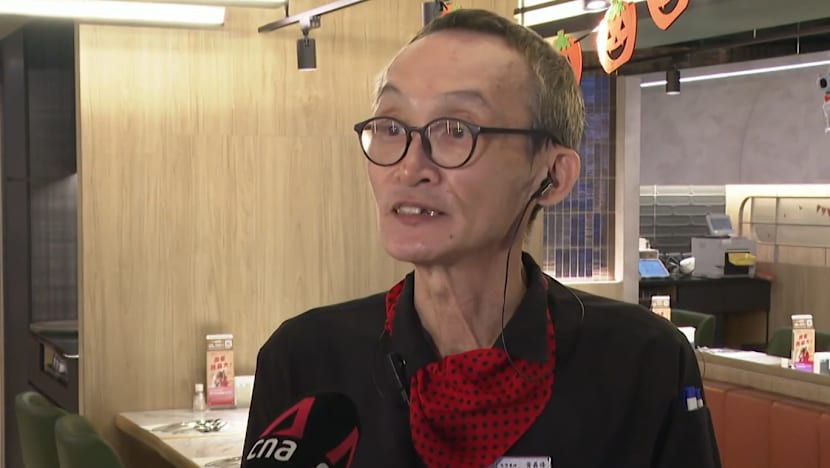Taiwan’s ageing workforce and low birth rate push seniors back into employment
In less than two decades, more than 6 million Taiwanese will reach the mandatory retirement age of 65 – a shift that is sounding alarm bells for businesses and officials.

Jeremy Huang, a 68-year-old Taiwanese waiter who returned to the workforce after retirement.

This audio is generated by an AI tool.
TAIPEI: At 68, Taiwanese waiter Jeremy Huang is still serving up dishes alongside colleagues less than half his age.
The former restaurant owner is among a growing number of retirees returning to work as Taiwan’s labour shortage worsens.
“I hope to still be a valuable member of society after retirement. What does that mean? It means to learn for as long as you live,” Huang told CNA while taking a break during his shift at Wowprime, one of the island’s largest restaurant chains.
“Physically, I don't think it's a big problem because I continue to ride a mountain bike every day for exercise. On the other hand, I think that coming to work is a good opportunity to keep myself fit,” he added.
MASSIVE RETIREMENT WAVES INCOMING
Taiwan is bracing for two massive retirement waves in the coming years, which are expected to shrink its working-age population by nearly 6.7 million people.
The first wave – which is ongoing – began in 2023 when baby boomers started leaving the workforce. The next wave of Generation X workers will follow in about 16 years.
Taiwan has a mandatory retirement age of 65. However, amendments to its Labour Standards Act were passed last year to allow employers to postpone an employee’s retirement past 65 if both parties agree.
Employment among those of retirement age in Taiwan has risen by about a third over the past decade, but analysts say more businesses will need to adapt by offering flexible hours, lighter workloads and senior-friendly environments.
Currently, only 10 per cent of those aged 65 and above still work – a lower rate than other ageing societies in Asia such as South Korea, Japan and Singapore.
A record high of 110,000 people are retiring in Taiwan each year, perpetually straining the labour market.
"Aside from middle-aged and older workers, women, as well as Taiwan’s new immigrants … will also become an important source of labour in the future,” said Chou Wen-Chi, professor at National Chung Cheng University.
Official data shows Taiwan's female participation in the workforce is about 52 per cent, lower than Japan, South Korea and Singapore.
Chou noted: “For businesses, that means companies will likely need to adopt more diverse employment practices when it comes to managing their workforce.”
DELAYING ENTRY TO WORKFORCE
The island officially became an “aged society” in 2018, when more than 14 per cent of its population hit age 65 and above.
Earlier this week, Taiwan’s Ministry of the Interior said this proportion now stands at 19.9 per cent – just shy of the 20 per cent threshold for a “super-aged” society.
Taiwan is also battling a low birth rate – its population declined for the 22nd consecutive month in October, according to data from the ministry.
This has made hiring tougher, compounded by many young Taiwanese spending more years in school and delaying their entry into the workforce.
Better paying jobs in the technology sector and flexible gig work have also become more attractive options for them, compared to certain sectors like the restaurant industry.
While the sector used to rely on young workers, this pipeline is growing narrower as the population ages, said Mark Lin, Wowprime’s deputy manager of human resources and development.
The chain has now been forced to turn to older workers like Huang instead.

Lin said the company adjusts the working hours and intensity of work for its middle-aged and older employees.
“For example, they might work three days and rest for two days, before working for another three days. This is so they can work in their best condition,” he said.
He added that making seniors part of the company’s long-term plans required a mindset shift.
"Is turning 65 a crisis? It can also be an opportunity. A friendlier workplace lets older workers keep contributing,” he pointed out.
For elderly waiter Huang, that opportunity is about more than work.
“I haven't set a limit for what age I will work until,” he said.
“If I can move, I will continue to maintain my health, live happily and work happily.”



















